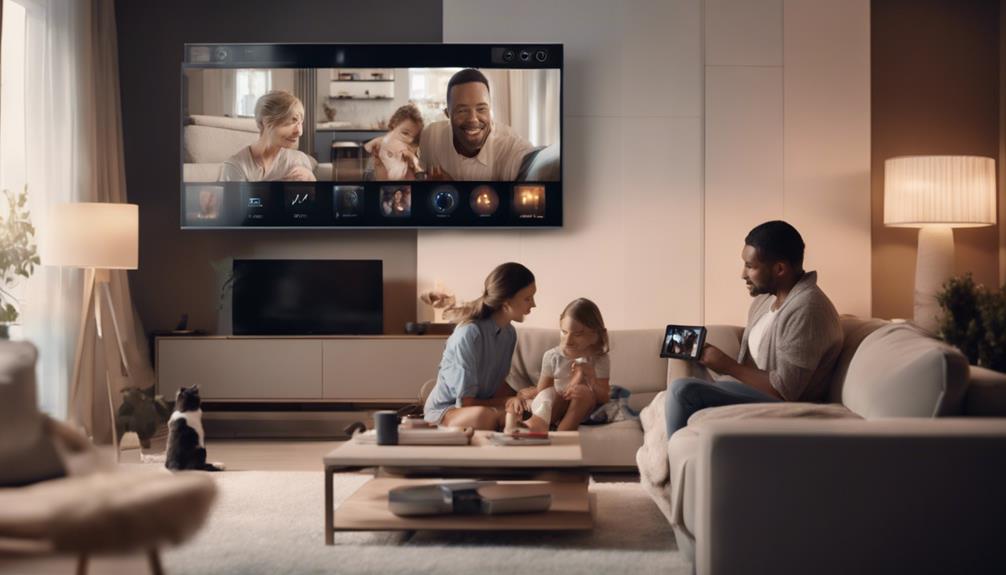Home security systems are essential for safeguarding your property against potential threats such as burglary and fire. These systems typically include sensors, cameras, and alarms. You can opt for do-it-yourself installations to save on costs or professional monitoring for more comprehensive supervision. It is important to assess your property type and future requirements when choosing a system. Additionally, consider the installation options and associated costs, which can vary depending on the complexity of the setup. Don’t forget to also prioritize cybersecurity features to protect against digital threats. There is a wealth of information available on various features and monitoring options that can assist you in selecting the most suitable home security solution.
Key Takeaways
- Home security systems protect against burglary, fire, and flooding with essential components like sensors and cameras.
- Choose between professional monitoring for 24/7 oversight or DIY self-monitoring to manage alerts independently.
- Evaluate system scalability to accommodate future additions, ensuring compatibility with smart home devices for convenience.
- Installation options vary; DIY offers flexibility and cost savings, while professionals ensure optimal placement in larger properties.
Understanding Home Security Systems
Home security systems are vital tools that protect your home from threats like burglary, fire, and flooding, giving you peace of mind. Understanding how these systems work can help you make informed decisions.
Core components include sensors for doors and windows, motion detectors, security cameras, and alarm systems. These elements work together to detect intrusions and alert you to potential dangers. Additionally, many systems now include features like garage door openers that enhance home security with modern technology, making it easier to monitor access points.
You can choose between DIY systems, where you install and monitor your own setup, or opt for professional monitoring, which involves trained technicians. Professional systems often provide 24/7 surveillance and rapid response to alarms, enhancing your security.
Additionally, many systems now include environmental protection features, such as smoke and carbon monoxide detectors, ensuring thorough safety beyond just break-ins. Battery power capabilities are also important, as they keep your system running during power outages.
Investing in a home security system not only deters criminals—research shows they can reduce break-in risks by up to 300%—but also provides layers of protection for your family and belongings. With the right system, you can truly enjoy peace of mind knowing you're safeguarding your home against various threats.
Selecting the Right System

Choosing the right home security system involves evaluating your unique needs and reviewing the various options available to guarantee thorough protection. Start by evaluating the type of property you have—whether it's a house, apartment, or business—and prioritize essential devices like cameras and smart locks.
Next, consider the monitoring options you prefer. You might opt for professional monitoring for continuous oversight or choose self-monitored home security systems for more cost-effective management of alert notifications. Scalability is also vital; select a system that allows for future additions of sensors and devices.
Lastly, confirm compatibility with smart home devices to enhance convenience. Here's a quick comparison to guide you:
| Feature | Basic System |
|---|---|
| Cameras | 1-2 basic cameras |
| Smart Locks | No |
| Monitoring Options | Self-monitored |
| Installation Fees | $50-$100 |
| Scalability | Limited |
Investing time in understanding these options will help you secure your home effectively. Remember, a well-chosen system can greatly enhance your peace of mind.
Monitoring Options Available

When it comes to monitoring options for security systems, you'll find three main choices that cater to various needs and preferences. Understanding these options can help you decide the best fit for your lifestyle and budget. In today's digital age, security systems must also consider cybersecurity measures to protect against potential hacking threats.
- Professional Monitoring: This option offers 24/7 surveillance through monitoring centers, providing rapid emergency response. It usually comes with monthly fees ranging from $5 to $65.
- DIY Self-Monitoring: With this approach, you manage alerts and notifications on your own, often without ongoing costs. It's an ideal choice for those looking for a budget-friendly solution.
Choosing the right monitoring option impacts your overall peace of mind. Professional monitoring guarantees quick emergency response, while DIY self-monitoring allows for personal control. Hybrid systems offer a balance, letting you adapt as your security needs change.
Whichever route you choose, make certain it aligns with your expectations for alerts and notifications, guaranteeing you stay informed about your home's safety.
Cost Considerations

Understanding the various monitoring options can help you grasp the cost considerations associated with home security systems. The costs can vary greatly depending on the type of system you choose, so it's vital to evaluate your budget.
Here's a quick overview of common costs:
| Cost Type | Range | Notes |
|---|---|---|
| Equipment Costs | $100 – $844 | Basic to advanced systems |
| Installation Fees | $49 – $249.99 | Varies by provider |
| Monthly Monitoring | $5 – $65 | Depends on professional service |
Many security companies now offer DIY systems, allowing you to bypass installation fees entirely, which can lead to a more affordable setup. Additionally, some providers have eliminated activation fees, which previously could reach $100.
When considering monthly monitoring, remember that professional monitoring can enhance security but may also increase costs. It's important to weigh these cost considerations against your security needs and preferences to find the best solution for your home. With the right approach, you can guarantee you get the ideal home security system that fits your budget.
Installation and Setup Options

Home security systems offer two main installation options: DIY setups that let you customize your system independently and professional installations where experts handle everything for you.
Choosing the right option depends on your comfort level with technology and your property size. It's also important to take into account the key factors in choosing a home cleaning service, as similar considerations can apply to selecting a security system provider.
Reflect on these factors when deciding:
- Installation Time: DIY systems can typically be set up in 30 minutes to 3 hours, while professional installations may take longer.
- Costs: DIY home security systems usually don't have additional costs, whereas professional services can range from $80 to $150.
- Monitoring Options: DIY systems often provide flexible monitoring, allowing you to opt for self-monitoring or professional monitoring without long-term contracts.
Ultimately, think about your needs and preferences. If you're tech-savvy and have a smaller home, DIY might be the way to go. If you want peace of mind and live in a larger space, professional installations could be worth the investment.
Frequently Asked Questions
How to Decide on a Home Security System?
To decide on a home security system, assess your property's vulnerabilities, choose between professional or DIY monitoring, consider scalability, evaluate your budget, and compare various brands to find one that suits your needs best.
What Is Required for a Home Security System?
To set up a home security system, you'll need a central hub, entryway sensors, motion detectors, cameras, and alarms. Consider adding environmental sensors for smoke and carbon monoxide to enhance your home's safety.
What Are the Pros and Cons of a Home Security System?
When considering the pros and cons of a home security system, you'll find enhanced safety and peace of mind alongside potential costs and false alarms. Weigh these factors to decide what's best for your home.
What Home Security Systems Can T Be Hacked?
Can any security system truly be hack-proof? While none are invulnerable, using systems with encryption, two-factor authentication, and dedicated cellular connections can drastically reduce your risk of unauthorized access and enhance your overall protection.
What Should I Consider When Choosing a Home Security System, According to the Cobb County Police Department?
When choosing a home security system, it’s important to follow cobb county police home security advice. Consider factors like the level of protection offered, reliability, and monitoring services. Evaluate your specific needs and budget to make the best choice for your home security.
Conclusion
As you weigh your options, remember that a home security system isn't just a purchase; it's an investment in peace of mind.
With the right choice, you can sleep soundly, knowing you're protected.
But what if you miss an essential feature or overlook a cost?
Imagine the relief of coming home to safety, but also the nagging doubt if you don't act soon.
Don't wait—take the first step towards securing your home today.
You'll be glad you did.









